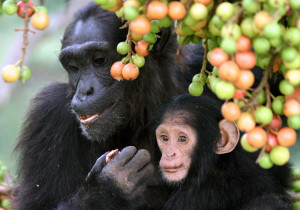Cooking, along with producing art; developing languages and creating technologies, is believed to be a uniquely human skill. According to a controversial theory developed by primatologist, Professor Richard Wrangham, of Harvard University, the development of cooking allowed our ancestors brains to become larger. Wrangham hypothesises that the ability to cook permitted an increase in protein consumption and hence facilitated brain development.
A team, also at Harvard University and led by Dr Felix Warneken, set out to investigate this theory. Their results, published this week in a journal of The Royal Society, suggest that chimps have most of the mental capacities required to cook food.
As it is obvious that chimps cannot cook, the scientists did not test the ability of the chimps to physically cook. Instead, they conducted experiments to investigate if chimps had the mental ability to engage in this behaviour. For example, they tested whether the chimps preferred cooked or raw food, whether they would be willing to wait for raw food to be cooked, and if they would put raw food in a box if scientists then switched it for cooked food. The chimps passed all of these three tests, amongst others, suggesting that they have the mental capacity required to cook.
So why, then, do chimps not cook? A key factor is that they cannot control fire. Additionally, Dr Warneken highlighted that chimps do not possess the ‘social skills’ required for cooking. Chimps are not able to trust that others within their group would not steal their food whilst preparing it to be cooked.
However the findings do suggest that the mental skills required for cooking were in place 5-7 million years ago. Warneken believes that these results support Wrangham’s hypothesis, commenting that “humans must have adopted cooking fairly early in their evolution.” With the cognitive ability in place to cook, all our ancestors would have needed to develop was the ability to control fire and the capacity to trust others.
However, other scientists question whether this research is relevant in investigation of Wrangham’s controversial theory, as it was not until much later in evolution that evidence of fire is observed. Professor Chris Stringer, of the Natural History Museum in London, exaplained.
“Cooking was an important milestone for humans in terms of making meat more digestible and neutralising pathogens and toxins, also for its social role, but best evidence for the ability to make fire at will only shows in the last 400,000 years”.
Putting it more bluntly, Professor Fred Spoor questioned the papers relevance, asking “who cares that early humans may have liked the idea of cooked food? Perhaps they would have liked eating naturally roasted carcasses of animals occasionally trapped in savannah fires, but that is not cooking.”
![Did Cooking Emerge Earlier Than Previously Thought? Cooking, along with producing art; developing languages and creating technologies, is believed to be a uniquely human skill. According to a controversial theory developed by primatologist, Professor […]](/wp-content/uploads/2012/12/News-image-01-300x1691.jpg)
